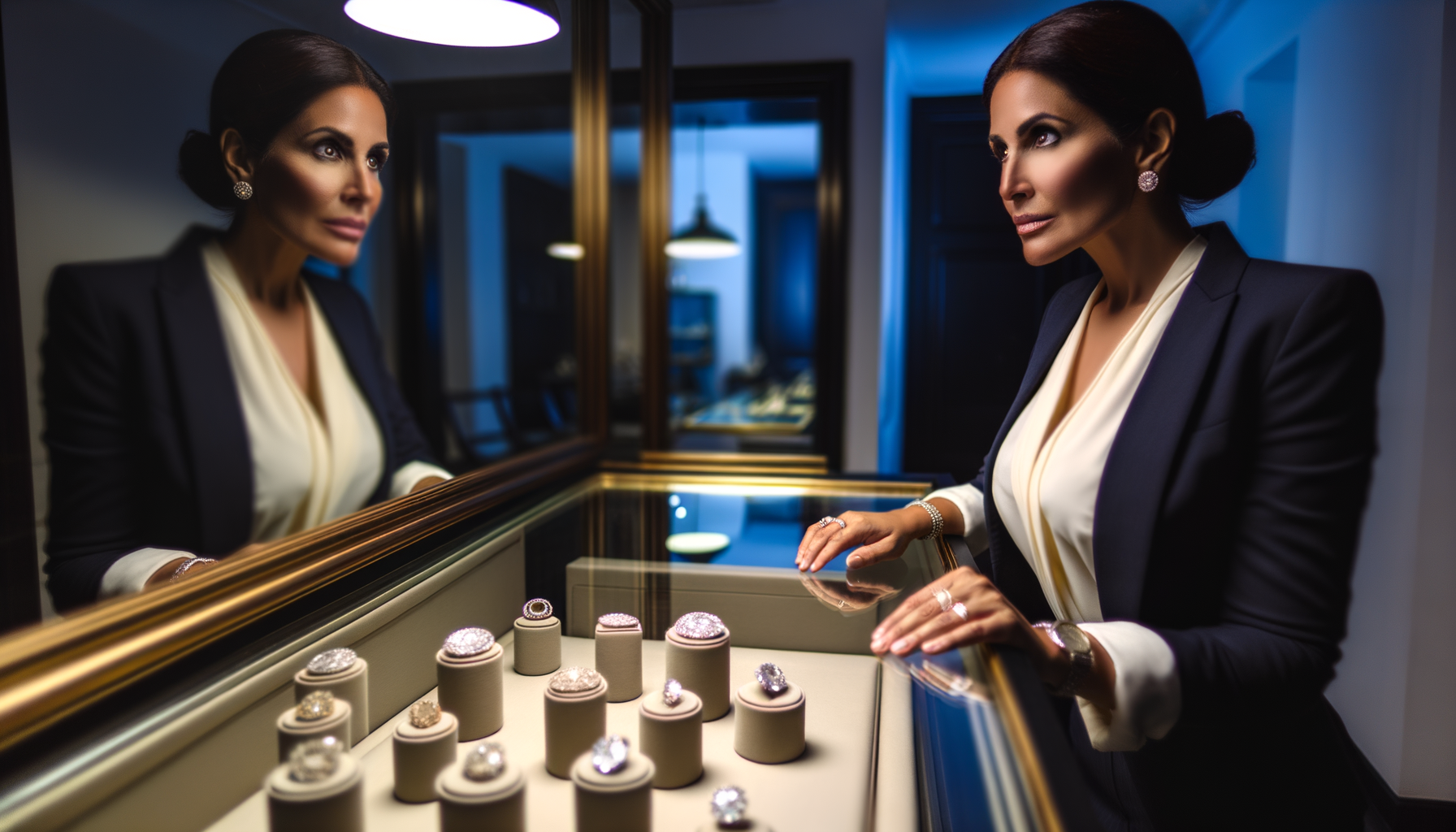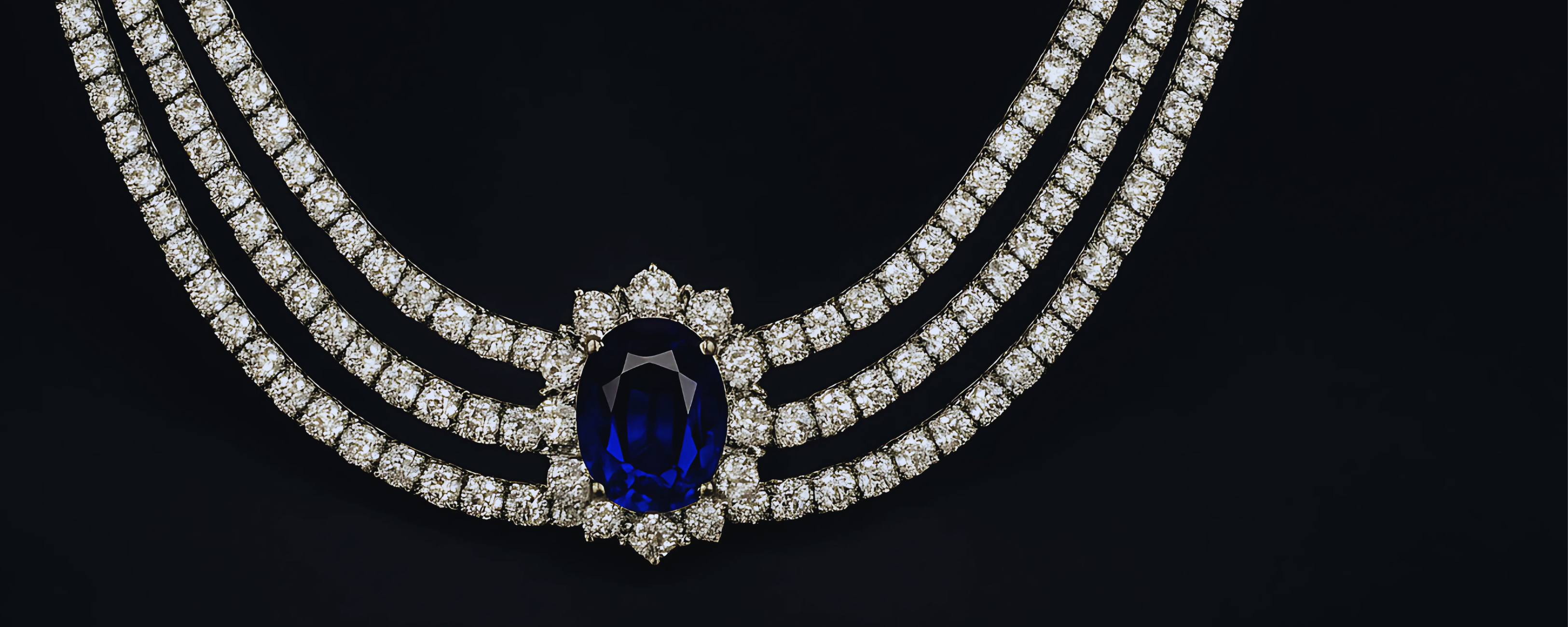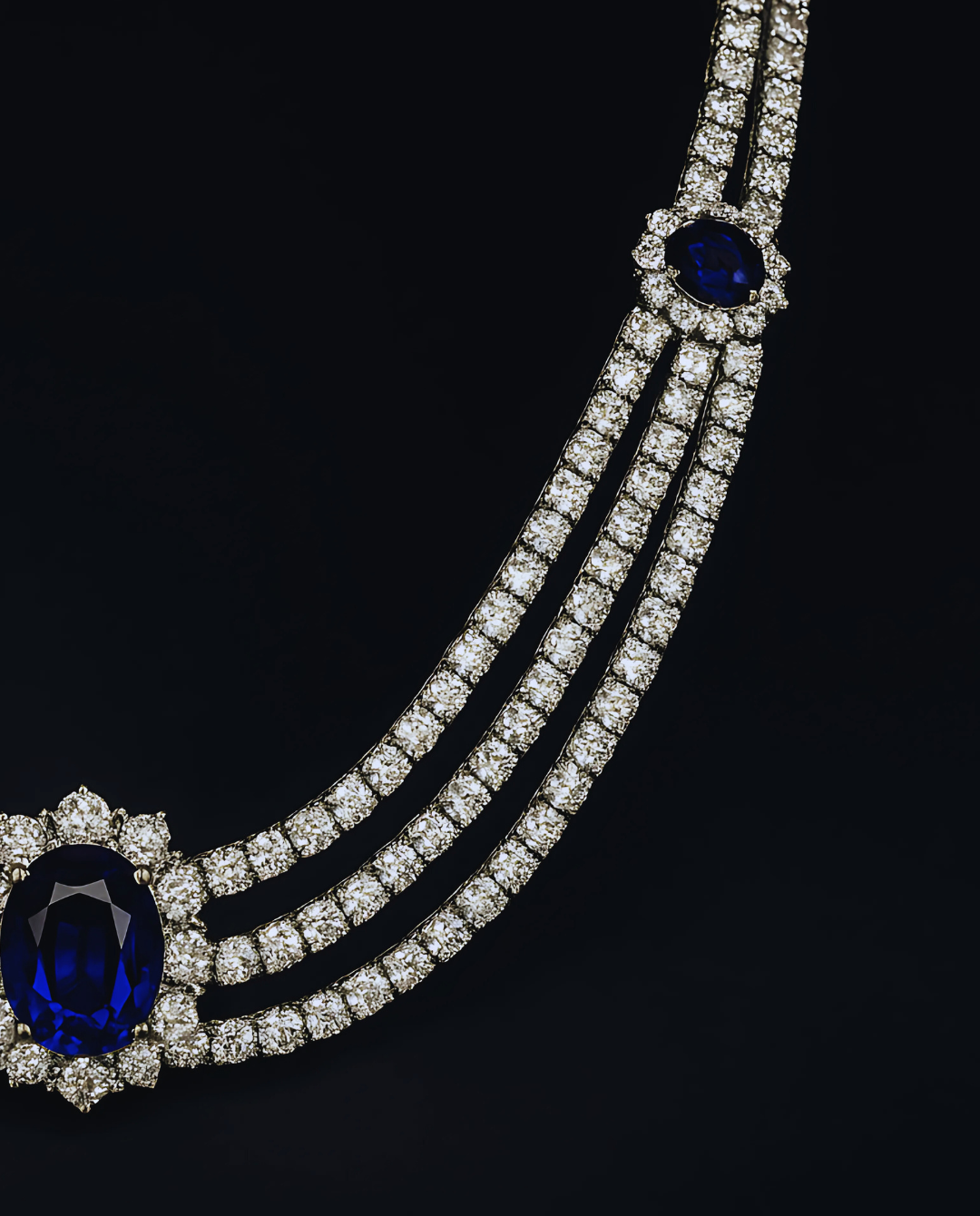Finding My Place Among Giants: Overcoming Imposter Syndrome as a Luxury Jewellery Entrepreneur
In this deeply personal account, Laura Chavez, founder of Lark & Berry, shares her journey through imposter syndrome whilst building a sustainable luxury jewellery brand in an industry dominated by centuries-old heritage houses. Learn how vulnerability became her strength and how questioning her belonging ultimately led to creating a more authentic luxury experience for customers.
The glossy black door of the heritage jewellery house on Bond Street felt impossibly heavy as I pushed it open. Perhaps it wasn't the door at all, but the weight of doubt pressing down on my shoulders. Inside, display cases gleamed under perfect lighting, highlighting diamonds that had adorned royalty and celebrities for generations. The security guard's gaze followed me—did he somehow know I didn't belong?
I was there on a reconnaissance mission of sorts, studying the competition whilst preparing to launch Lark & Berry. But standing there, surrounded by centuries of tradition and wealth, a voice inside whispered: "Who do you think you are?"
When Imposter Syndrome Strikes the Entrepreneurial Spirit
That moment in the prestigious jewellery house wasn't my first brush with imposter syndrome, nor would it be my last. As a founder entering the rarefied world of luxury jewellery—a realm dominated by heritage brands with histories stretching back hundreds of years—feeling like an impostor was almost inevitable.
Imposter syndrome is that persistent feeling that you've somehow tricked everyone into believing you're competent, knowledgeable, or deserving of your position—and that at any moment, you'll be exposed as a fraud. For entrepreneurs, particularly those disrupting established industries, this psychological phenomenon can be especially acute.
In my case, I was not only a newcomer to an industry steeped in tradition, but I was deliberately challenging its foundations by focusing exclusively on lab-grown diamonds when most luxury jewellers still considered them taboo. The audacity of it all sometimes left me breathless with doubt.
Expert Tip: Recognising Imposter Syndrome
Imposter syndrome often manifests as:
- Attributing your success to luck rather than ability
- Fear of being "found out" as inadequate
- Downplaying your expertise despite evidence of your competence
- Setting impossibly high standards for yourself
- Feeling like an outsider in your industry
The Comparison Trap: Standing in the Shadow of Giants
I'll never forget my first major industry event. While everyone networked confidently, I clutched my champagne flute like a shield, acutely aware that my brand was merely months old while others measured their heritage in centuries.
"Which house are you with?" someone would inevitably ask.
"I've just founded Lark & Berry," I would reply, feeling the weight of every syllable. "We work exclusively with lab-grown diamonds."
The reactions ranged from polite interest to barely concealed dismissal. One particular interaction stands out—a jewellery buyer from a prestigious department store who looked at me as though I'd suggested selling costume jewellery alongside Cartier.
"Interesting concept," she said, her tone suggesting it was anything but. "But do you really think the luxury market will accept... alternatives?"
Walking home that evening, I found myself staring at the window displays of those established brands. Their pieces gleamed with the confidence of brands that had dressed queens and Hollywood royalty. How could my vision possibly compete?
The Internal Dialogue of Self-Doubt
The mind of an entrepreneur with imposter syndrome becomes a battlefield of contradicting thoughts:
- "I don't have enough experience to revolutionise this industry."
- "These established brands have perfected their craft over centuries."
- "What if lab-grown diamonds never gain acceptance in high jewellery?"
- "Everyone else seems to know exactly what they're doing."
- "Perhaps I should be more conventional to be taken seriously."
At its worst, this self-doubt led me to question the very foundations of Lark & Berry. Should I compromise on our exclusively lab-grown diamond commitment to gain faster acceptance? Should I mimic the aloof luxury positioning of heritage brands rather than forge our own path?
The Turning Point: Finding Authentic Confidence
My perspective began to shift after a conversation with a mentor who had built her own successful business in a male-dominated industry. Over coffee in a quiet corner of a Mayfair café, I confessed my feelings of inadequacy.
"You know what the difference is between you and those heritage brands you admire?" she asked. "They've already written their story. You're still writing yours. That's not a disadvantage—it's your greatest asset."
She continued: "Those established jewellers can't easily change course—they're bound by tradition and expectation. But you? You're building something responsive to today's values. That's powerful."
Her words resonated deeply. I began to see that my supposed weaknesses—being new, being different, challenging convention—could actually be strengths. The very thing that made me feel like an impostor—my outsider status—gave me the freedom to innovate.
Expert Tip: Reframing Imposter Syndrome
Transform your perspective with these strategies:
- Recognise that feeling uncertain means you're growing and challenging yourself
- Document your achievements and successes to review during moments of doubt
- Understand that even industry veterans experience uncertainty
- View your outsider perspective as a valuable asset for innovation
- Separate feelings from facts—acknowledge the feeling without accepting it as truth
From Intimidation to Inspiration: The Transformation
Gradually, I began to approach industry events and competitor research differently. Instead of seeing established brands as intimidating giants exposing my inadequacies, I viewed them as teachers offering valuable lessons in craftsmanship, storytelling, and customer experience.
I'd admire the precision of a perfectly set sapphire earrings in a heritage jeweller's window, then return to our studio with renewed determination to achieve that level of excellence—but in our own, more sustainable way.
This shift wasn't instantaneous. There were still moments of crippling self-doubt, particularly when faced with setbacks or criticism. But increasingly, I recognised these feelings as signs that I was pushing boundaries and creating something truly innovative.
Building Resilience Through Vulnerability
Perhaps the most transformative insight came when I stopped trying to suppress my vulnerability and instead embraced it. I began sharing my journey more openly—with my team, with industry peers I trusted, and eventually with our customers.
To my surprise, this honesty resonated powerfully. Other industry newcomers confessed similar feelings. Customers appreciated our transparency about being a young brand still perfecting our craft. What I had perceived as weakness became a cornerstone of Lark & Berry's authentic voice.
How Vulnerability Shaped Our Brand Identity
The experience of navigating imposter syndrome profoundly influenced Lark & Berry's development. Rather than mimicking the often intimidating aura of traditional luxury jewellers, we embraced accessibility and authenticity as core values.
This manifests in several ways:
Approachable Luxury
We deliberately created spaces—both physical and digital—where customers wouldn't feel judged or intimidated. Our boutique was designed to feel welcoming rather than imposing. Our staff are trained to educate and engage, never to condescend.
One customer recently shared: "I've always felt uncomfortable in traditional jewellery houses, like I'm being silently evaluated. At Lark & Berry, I feel like I'm having a conversation with a knowledgeable friend who genuinely wants to help me find the perfect piece."
Transparent Communication
My experience with self-doubt made me acutely aware of how mystification can create barriers. We're transparent about our materials, our processes, and even our learning curves as a growing brand. Whether discussing the specifications of a diamond engagement ring or explaining the benefits of lab-grown stones, clarity is our priority.
Celebrating Growth Over Perfection
Rather than presenting ourselves as infallible, we share our evolution as a brand. Each collection represents not just beautiful jewellery but lessons learned and skills refined. This narrative of continuous improvement has created a community of customers who feel part of our journey rather than mere consumers.
Finding Strength in Authenticity
Looking back at that day in the heritage jeweller, feeling like an impostor, I now recognise it as a pivotal moment in my entrepreneurial journey. Those feelings of inadequacy didn't signal that I didn't belong in the industry—they were growing pains as I found my authentic place within it.
Today, when I visit those same established jewellers, I feel something different. Not the crushing weight of comparison, but appreciation for their craftsmanship alongside confidence in our different path. There's room for both the centuries-old traditions and the new perspectives that brands like Lark & Berry bring to the industry.
Imposter syndrome hasn't vanished entirely—it still makes appearances, particularly when we're pushing into new territory or taking significant risks. But now I recognise it as a signal that I'm growing, challenging conventions, and staying true to our mission of redefining luxury jewellery for a more conscious generation.
To fellow entrepreneurs navigating similar feelings: your doubts don't define you—they refine you. The very qualities that make you feel like an outsider may be precisely what the industry needs. Your unique perspective isn't just valuable; it's essential.
Frequently Asked Questions About Entrepreneurship and Imposter Syndrome
Is imposter syndrome common among entrepreneurs?
Absolutely. Studies suggest that up to 70% of successful people experience imposter syndrome at some point. Entrepreneurs are particularly susceptible because they often work in uncharted territory and face frequent evaluation from investors, customers, and competitors.
How can entrepreneurs overcome feelings of being an impostor?
Strategies include: documenting achievements and positive feedback, building a supportive network of fellow entrepreneurs, working with mentors who understand your journey, separating feelings from facts, and recognising that discomfort often signals growth rather than inadequacy.
Can imposter syndrome actually benefit entrepreneurs?
When channelled productively, imposter syndrome can drive continuous learning, encourage humility, and foster greater empathy with customers and team members. Many successful entrepreneurs credit their initial self-doubt with pushing them to over-prepare and develop stronger business plans.
How do heritage luxury brands respond to industry newcomers?
Responses vary widely. Some established luxury houses view newcomers with scepticism, particularly those challenging industry norms. Others recognise the value of fresh perspectives and innovation. The most forward-thinking heritage brands often seek partnerships or mentorship opportunities with promising new entrants.
How important is authenticity in luxury brand building today?
Increasingly critical. Today's luxury consumers, particularly younger demographics, value transparency and authenticity alongside craftsmanship and exclusivity. Brands that authentically share their journey, including challenges and values, often forge stronger emotional connections with customers than those maintaining an impenetrable facade of perfection.




Leave a comment